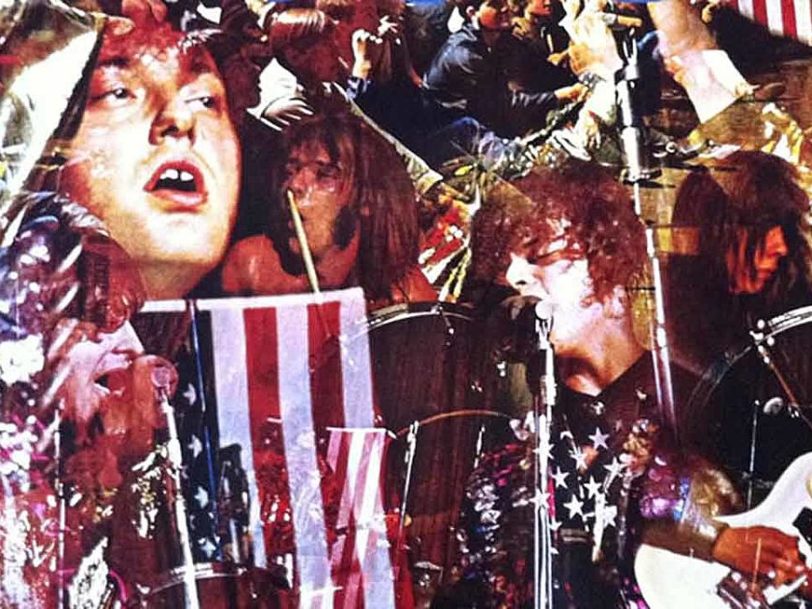Influential, leftist-leaning US proto-punks, Detroit’s MC5 (short for “Motor City Five”) may have been out of step with the peace-and-love hippie ideal prevalent throughout the late 60s, but their abiding philosophy (“rock and roll, dope and fucking in the streets”) chimed with the zeitgeist in 1968. Their incendiary debut album, Kick Out The Jams, provided the perfect soundtrack to a turbulent 12-month spell during which the Vietnam War intensified and riots broke out in Paris and London’s Grosvenor Square.
Listen to Kick Out The Jams here.
“You couldn’t have a more accurate representation of the band”
Unusually for a debut album, Kick Out The Jams was a live recording, compiled from two adrenalised MC5 shows recorded at Detroit’s Grande Ballroom on Halloween, 1968, rather than sterile studio sessions. Yet the band’s motives were pragmatic as well as philosophical. After a couple of years of non-stop gigging, the stage was their natural domain.
“We didn’t think it was at all strange that we were going to record Kick Out The Jams live,” MC5 manager, poet and political activist John Sinclair recalled in a 2007 interview with Uncut. “It was bold to do a live album as a first album, but that was our aesthetic. We were a band who put on a show when nobody put on a show, except The Who. You couldn’t have a more accurate representation of how the band sounded.”
“It was so intense; we knew we had something!”
Initially founded by guitarists Wayne Kramer and Fred “Sonic” Smith in 1964, MC5’s classic line-up had coalesced by 1965 with the arrival of vocalist Rob Tyner, bassist Michael Davis and drummer Dennis Thompson. They initially released a couple of cult-level singles, including a cover of Them’s I Can Only Give You Everything, but right from the start it was the group’s high-energy live shows which built their reputation.
Described by contemporary rock writer Don McLeese as “a street rumble or an orgy”, MC5 were truly unforgettable on their night. Long before they had a record deal, they were drawing audiences of well over 1,000 to their shows in Detroit, and they frequently upstaged the headlining act, Big Brother And The Holding Company, during a joint tour of the US East Coast during the summer of 1968.
Remarkably, that legendary run of dates led to Rolling Stone granting MC5 a cover story while they were still unsigned, but that situation quickly changed after Elektra Records’ A&R man Danny Fields visited Detroit and came away having signed both MC5 and their local sparring partners, The Stooges. Suitably impressed, Fields, Elektra CEO Jac Holzman and producer Bruce Botnick all recognised MC5 were at their best when playing for a receptive audience, so gave the green light for the band to record two shows at Detroit’s Grande Ballroom to make up Kick Out The Jams.
“I wanna hear some revolution out there!”
PopMatters reviewer Adam Williams later declared that “no live recording has captured the primal elements of rock more than the MC5’s inaugural effort” and it’s true that Kick Out The Jams remains a seismic statement of intent, five decades after its initial release. Rob Tyner whipped the crowd up with an evangelical zeal worthy of Billy Graham (“Brothers and sisters, I wanna hear some revolution out there!”), while the record’s first half found the band tearing through proto-punk classics including Ramblin’ Rose, Rocket Reducer No.62 (Rama Lama Fa Fa Fa) and the intense Come Together.




